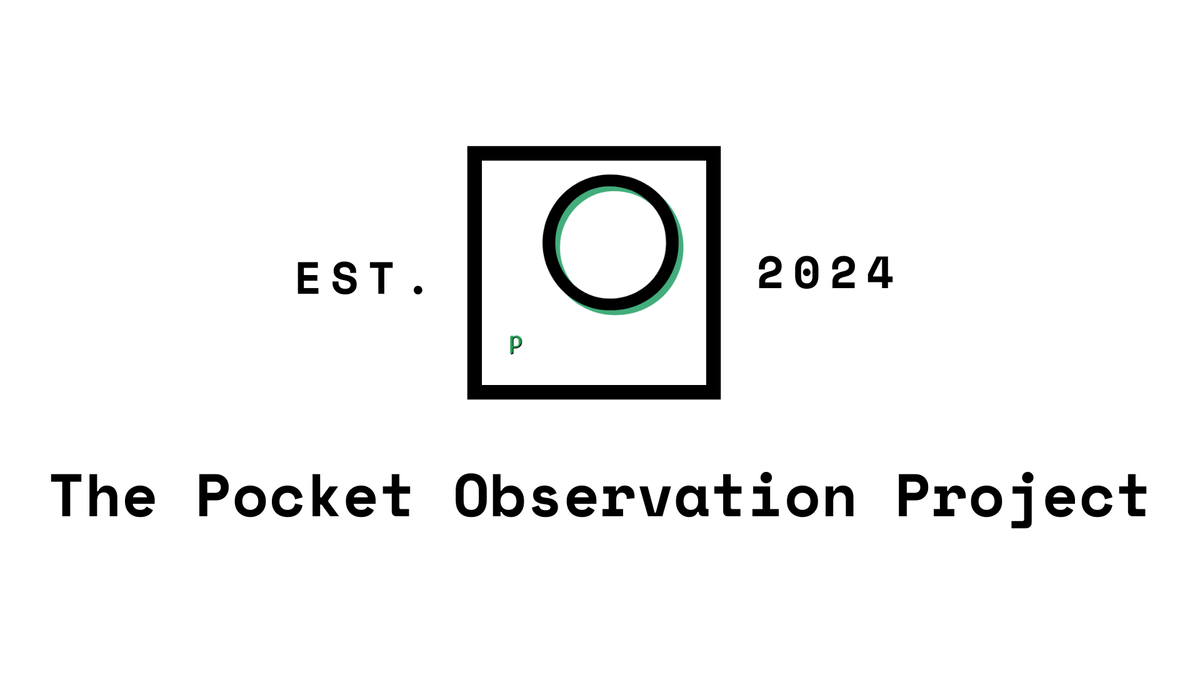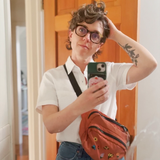July Observance
This project is exclusively available to Pocket Observatory members.

This project is funded by and available to Pocket Observatory members. Thank you so much for your support.
Hello Observers!
I am so, so pleased to be sending you the pilot Observance! (Not sure what I am talking about? Catch up right here!)
Over the next couple of weeks, I will send out surveys to get your feedback on proposed processes for The Pocket Observation Project. I will also send you my own responses to the July Observance.
Dear Observer,
I am delighted to welcome you to The Pocket Observation Project! (I just wrote those words in a coffee shop. Immediately teared up. Are we doing this? We are!)
On August 1st, the first Official Observance will be sent out to all Pocket Observatory members. It will all feel very…well…official! There will be a document that full explains the scope of the project, along with detailed prompts for the month of August. The prompts will be about things that are timeless and things that are current. (And things that are currently timeless? Timelessly current?)
For this pilot Observance, the questions will deal with the resources, experience and practice you are bringing to your personal Pocket Observation practice.
Cultural documentation is a serious pursuit! It deserves (even requires) serious parameters. Before an ethnographer goes into the field, they determine what resources their project will require and commit to ethical inquiry and documentaton. There is no reason to take your own observatory work any less seriously!
What resources do you currently have in your (literal or metaphorical) pocket that will aid your work as an observer?
A lot of things can be counted as resources! Time to is a resource! Time dedicated to observation or documentation. A commute on mass transit each day can a time resource. A walk through your neighborhood. Trips taken for work. Or just the few minutes you have to yourself very early in the morning, or very late at night.
Occupation can be a resource! A neurosurgeon is going to have the opportunity observe different things than baker and a baker will have the opportunity to experience different things than a careworker and a careworker will have the opportunity to observe different things than a retail worker.
Location can be a resource. So can language. Curiosity, compassion? Those are also resources! Do you need anything to start this project? A new notebook? Ten minutes carved out of each day? What else?
This next question is from the 2008 Mass Observation directive. I thought it would be fun to answer it here, as a way to help us become aware of the events that contextualize your perspective.
“Mass Observation is all about people’s lives looking backwards and forwards. Could you draw us your “lifeline” marked up with the key events in your life? If you have never done one before, you start in the year of your birth and come up to the present. Then you mark off as many key events as you think are really important to you….”
Your lifeline can be as general or as detailed as you’d like! Every single observation you make is informed by where + how you have been, where + how you are, where + how you are going. Listen, no lifeline is going to capture everything! And what feels like a “key” moment now might not in five years. So, don’t feel overwhelmed by this!
If it feels too daunting or too reductive to list traditional milestones, give your lifeline a theme! A lifeline of times you changed living locations, a lifeline of your most important meals, a lifeline of pop cultural moments that influenced you. Have fun with it! The theme you choose will tell you something about what you observe too!
Pocket Observation is a practice. It may not feel habitual at first. It will take some time to develop the customs of your own observation. And those customs will probably change, as you change. Because, yes…observing with care will change you. (This is one of the only things I know.)
In the 1980s, Mass Observation eased new Observers into observation by asking them to detail their meals for an entire day. What the observer ate, where they ate, how the food was prepared. This makes some good sense! The way people sustain themselves tells us a lot about a culture.
But I think there are lots of reasons a meal log might not be the best way for an observer to begin adopting the practice of observation. There have been many times in my life when keeping a log of meals might have triggered a bout of disordered eating. Feel free to answer the meal prompt! But here are two others, just in case!
Choose a day to observe the audio content you listen to - songs, podcasts and any other recorded audio. How did a song make you feel? A playlist? What advertisements did you hear? Did you learn anything new from a podcast? What were you doing while you listened? How did listening help or hinder your day?
List the locations your body was in today. How did it get there? Walking, rolling, skipping, driving, biking? What paths led from one location to another? (Right down the hall, left at the kitchen door, out the backdoor to the car.) Describe a single transit in detail.
Was your mind always with your body? Or did it wander? What does it mean when your mind wanders? Was the wandering triggered by objects or events in one of your physical locations?
Until next time,
Meg
A Fellow Observer


